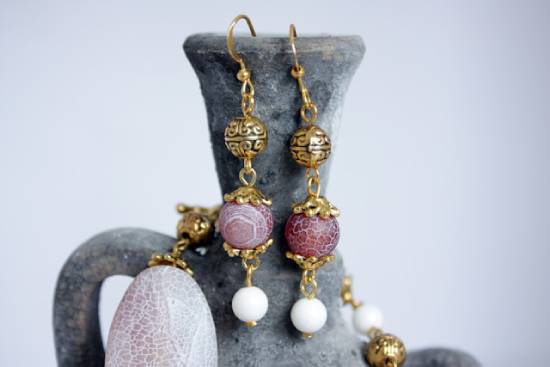If you walk into a Seventh-day Adventist church service, you might notice that many people aren’t wearing earrings, bracelets, necklaces, or sometimes even wedding rings. It’s common in Adventist communities to forego these external flourishes, often referencing the principle behind 1 Peter 3:3-4, which cautions us not to let our outward adornment be what our beauty or appeal comes from.
However, this isn’t a rule or standard of the denomination, and several Adventists do choose to wear jewelry or other select items that could be considered adornment. It’s certainly not an issue of salvation or how “holy” someone is, and it’s not a condition of church membership.
But where did this collective emphasis on modesty come from? Why was it a significant issue in the early days of the denomination, and is the emphasis the same today?
Let’s find the answers to these questions and also look at what Scripture has to say. We’ll cover:
- Why the emphasis on minimizing adornment, specifically jewelry?
- What the Bible says about wearing jewelry
- Do Adventists believe wearing jewelry is a sin?
We’ll start with some history and background.
What’s behind the collective Adventist emphasis on minimizing outward adornment?

Photo by Tamara Bellis on Unsplash
When the Adventist Church was formed in the 1800s, many of the church’s leaders were concerned about the effects of a few of the trends of contemporary society. One of those trends involved a fixation on expensive jewelry and clothing.
In the Victorian era, the divide between the wealthy aristocracy and the “common” classes was evident not only by career, location, or pedigree, but by how people adorned their outward appearances. This frivolous focus of the society of that day brought up concerns about its effect on spirituality, especially considering the way Scripture cautions against pride, greed, materialism, and other things that can be related to excessive adornment.1
So let’s talk about outward adornment.
What makes something “adornment”? According to Collins Dictionary, adornment is “something that is used to make a person or thing more beautiful.”2
Jewelry is most commonly associated with adornment because it’s clear that it’s something extra, rather than something purely functional. A shirt serves the function of covering a torso, while a necklace’s function is to be an extra flourish.
Adornment isn’t inherently bad. And there are many places in Scripture where it’s talked about in a neutral, face-value sense, or even positively.3
But like most things, if we get too wrapped up in it, it can lead to pride.
Or we start deriving our worth from the things about us that are supposed to be “extra.”
Focusing on all our possessions can make us feel that those things help us fit in or stand out, or show how much money we have, or give us the attention or self-worth we think we’re otherwise lacking. They lead us away from what’s more important in life: each of our identities as a unique child of God, and our relationship with Him as our loving Creator.
That’s why we often hear about materialism-based pride being an easy trap to fall into if we focus too much on outward adornment.
The Bible warns us about the problem with materialism in several places. Jesus advised the Jews to “take heed and beware of covetousness, for one’s life does not consist in the abundance of the things he possesses” (Luke 12:15, NKJV).4 “Things” are nice, but they aren’t everything. People and relationships are far more important.
And King Solomon knew how dangerous materialism was when he penned these words in Proverbs:
“A good name is to be chosen rather than great riches, loving favor rather than silver and gold” (Proverbs 22:1, NKJV).
His words are powerful because we know he spoke from experience. He had gotten so wrapped up in his wealth and everything that came with it, that for a time, he strayed away from God and let himself be enticed by anything that tempted him. Only after he had been humbled were his eyes opened and he saw how meaningful it was to be chasing after possessions.
And 1 Timothy 6:7-8 reminds us,
“For we brought nothing into this world, and it is certain we can carry nothing out. And having food and clothing, with these shall we be content” (NKJV).
But the worst part about materialism is its connection with pride. Rather than recognizing good things as gifts from God, it’s easy to see our hoarded wealth and possessions as signs of our own worth or power. We get caught up focusing on our own abilities, rather than God’s.
Instead, the Bible promotes modesty and humility (Psalm 25:9; 1 Peter 5:5; James 4:6-7).
(And typically, a humble person is a lot more pleasant to be around than a proud person!)
But in addition to these fundamental tendencies of a fallen human nature, there was even more behind early Adventism’s emphasis on adornment through jewelry and fashion.
Cultural background
During the 1800s, when the Seventh-day Adventist Church was formed, if people wore jewelry, it was typically to reflect their wealth.5 It was an intentional indication of status.
And the more flashy or expensive the jewelry, the more “respect” and recognition it was supposed to demand from others.
Many Christian churches already discouraged the wearing of jewelry—as well as other unnecessary accessories like lace, ribbons, collars, and expensive tailored coats and hats—well before the Adventist Church got started.6 So many of the leaders and influencers in early Adventism, who came from these churches, already held this viewpoint. They recognized this as a common gateway to pride, since it was a very noticeable and public way to announce one’s wealth.
After all, Scripture famously cautions that a focus on wealth can be a significant roadblock to faith and spiritual health.
“It is easier for a camel to go through the eye of a needle than for a rich person to enter the kingdom of God” (Mark 10:25, CSB).

Photo by Sandy Millar on Unsplash
So to counteract this, early Adventists encouraged church members to dress simply and modestly. And this wasn’t presented as a rule, but as spiritual counsel.
This included jewelry, unless it had a more practical purpose or function. Ellen G. White, one of our church founders, was given a piece of jewelry once, and she wore it because it was pretty yet not showy, and because it functioned as a clasp on her dress.7
For example, many Adventists then and today choose to wear wedding rings, though there are many who choose not to. But while they are “jewelry,” they serve as a symbol of love and marriage. They also demonstrate to other people that the person is in a committed relationship, which helps deter unwanted attention.
For Adventists, jewelry is also linked with stewardship. Stewardship refers to the responsibility God bestows on us to care for His church, the world, people, etc. This includes managing your money well. Buying jewelry to display your wealth instead of saving the money or using it for something more necessary isn’t always good stewardship.
But to get to the root of these principles and decisions Adventists have made about jewelry and outward adornment, let’s look at what Scripture says.
What the Bible says about wearing jewelry
The Bible mentions adornment, modesty, and other related things in several places, both in the Old Testament and the New Testament. Here are a few verses most commonly associated with it.
1 Timothy 2:9
This verse reads:
“Also, the women are to dress themselves in modest clothing, with decency and good sense, not with elaborate hairstyles, gold, pearls, or expensive apparel” (1 Timothy 2:9, CSB).
Here, the Apostle Paul advises the people to dress modestly, avoiding outlandish styles and unnecessarily expensive clothing and jewelry. Note the emphasis on “decency and good sense” as virtues to aspire toward when it comes to physical appearance.
Today, the principle is just as meaningful. It encourages us to dress modestly and avoid prideful displays of wealth. This goes hand-in-hand with 1 Peter 3:3-4.
Adventists, in an attempt to follow the principles of this verse, generally avoid jewelry because it’s easy to overdo it with flashy or expensive items.
Isaiah 3:18-20
These verses say,
“In that day the Lord will take away the finery: the jingling anklets, the scarves, and the crescents; the pendants, the bracelets, and the veils; the headdresses, the leg ornaments, and the headbands” (Isaiah 3:18-20, NKJV).
Though these verses look like they’re focusing on specific items people shouldn’t wear, context is important to bring out the full meaning of the verses.
Many of these pieces of jewelry mentioned in the verses were worn by elite, prideful Israelites who were mistreating the poor.
By listing the jewelry, Isaiah described the upper class and predicted how God would bring them down for their injustice.8
Isaiah wasn’t saying the jewelry itself was improper, he was describing the people who were acting improperly, and how the jewelry represented their priorities.
Genesis 35:2-4

Photo by Yuliya Yevseyeva on Unsplash
Not long before Jacob was renamed Israel, he told his household to get rid of their idols, change their clothes, and purify themselves.
“So they gave Jacob all the foreign gods which were in their hands, and the earrings which were in their ears; and Jacob hid them under the terebinth tree which was by Shechem” (Genesis 35:4, NKJV).
Let’s look at the context to see why earrings were singled out, and not bracelets or necklaces.
It’s important to understand the culture. As many Bible commentaries suggest, earrings at that time were used as charms and were often engraved with images of pagan gods and mysterious sayings.9
Earrings also denoted rank or status in society—which could lead to pride.10
These heathen and prideful characteristics are why God told Jacob to have them removed. Not necessarily because the earrings were immodest or wrong themselves, but because of what they culturally represented.
Genesis 24:47-48
This description of jewelry occurs when Abraham’s servant travels to the city of Nahor to find a wife for Isaac. Through God’s guidance, he finds Rebekah.
“Then I asked her, and said, ‘Whose daughter are you?’ And she said, ‘The daughter of Bethuel, Nahor’s son, whom Milcah bore to him.’ So I put the nose ring on her nose and the bracelets on her wrists” (Genesis 24:47, NKJV).
This verse contains no negative implications of jewelry.
In that culture at that time—and even today—nose rings and bracelets were common, everyday accessories.11 They weren’t thought of as symbols of pride like the other verses suggest in the Israelite and Roman-Christian cultures.
These gifts were given to Rebekah for kindness or possibly as an engagement gift, and with God’s approval (Genesis 24:12, 26-27).
This gift of a nose ring is found in other places in the Bible, such as Ezekiel 16:12. In this verse, God symbolically puts a nose ring in Jerusalem, which represents His wife. It was meant to show His relationship with them.
However, a few verses later, Ezekiel shows what can happen when adornment becomes an act of fixation on beauty or status. He says that Jerusalem “trusted in [its] own beauty” and became a spiritual prostitute (Ezekiel 16:15, NKJV).
Both the verses in Genesis and Ezekiel describing the gift of the nose ring must be taken within the context of the culture and the time. They could represent different things in today’s cultures. It’s best to use our discretion and try to be modest and humble, aspiring to be good stewards with what God has given us in our lives.
So all in all, what do all these verses show us about jewelry? They advise us to think carefully about our motives. As mentioned earlier, it’s good to ask ourselves, why are we wearing the jewelry?
Ultimately, we don’t want the outward appearance of our jewelry to distract us or others from God and His principles. It can’t be denied that what we wear potentially sends a message to others. Jewelry and other extravagant clothing could send the wrong message, even unintentionally.
And this applies to things other than jewelry as well, of course. Excessive adornment can happen with our houses, our cars, or any number of things that aren’t needed or are “extra.” We could even flaunt our accomplishments or titles as a way of adorning how we’re perceived, trying to enhance how others think of us.
The bottom line is, what we adorn and how we adorn things can be an indicator of our priorities. And if we’re elevating things that are earthly and placing more importance on those things than God and our relationship with Him, it’s time for some soul-searching. Otherwise, we risk becoming like the “rich young ruler” written about in Matthew 19:16-22.
But back to jewelry—since many Adventists do not wear it, do they consider it a sin?
Do Adventists believe wearing jewelry is a sin?

Photo by Maddi Bazzocco on Unsplash
Absolutely not. While Adventists tend to advise against wearing jewelry, we do not see it as a sin, and no Adventist or Adventist church should ever hassle you about it.
Some churches might have different viewpoints about jewelry, but it’s not supposed to be an issue of membership, salvation, or general acceptance.
And some individuals in some churches might pressure you to take it off, but this is not appropriate, and don’t feel that you have to do as they say. Many Adventists do wear jewelry, and wearing it or not wearing it doesn’t affect your ability to be saved or to be loved and used by God.
It’s a personal decision we make with God. You can always talk to a pastor or elder if you have questions.
The only time jewelry could become a problem is, as described earlier, when it somehow gets in the way of your relationship with God.
And that relationship is what really matters.
Jesus gave some sound advice when He said,
“‘Do not lay up for yourselves treasures on earth, where moth and rust destroy and where thieves break in and steal; but lay up for yourselves treasures in heaven, where neither moth nor rust destroys and where thieves do not break in and steal. For where your treasure is, there your heart will be also’” (Matthew 6:19-21, NKJV).
The things on this earth might be attractive and fun. And that doesn’t make them all wrong. But it’s important for us to remember that in the end, they don’t matter. They pale in comparison to what God has in store for us in heaven and in the New Earth (1 Corinthians 2:9).
Related Articles
- Matthew 19:24; Luke 12:15; 1 Timothy 2:9-10; 6:10; Isaiah 3:16-24; 1 Peter 3:3-4 [↵]
- “Adornment,” Collins Dictionary, [↵]
- Exodus 28:20; 2 Chronicles 3:6; Job 40:10; Psalm 93:5; Proverbs 3:22; Isaiah 61:10; Matthew 6:29; Luke 12:27; Titus 2:10 [↵]
- 1 Timothy 6:7-8, Luke 12:15, Proverbs 22:1. [↵]
- Lasiter, Lyndon, “Victorian Era Jewelry: Style and Characteristics,” M. S. Rau, [↵]
- Braun, Dennis H., “A Seminar on Adventists, Adornment, and Jewelry,” Andrews University, p. 25, [↵]
- Braun, Dennis H., “A Seminar on Adventists, Adornment, and Jewelry,” p. 43. [↵]
- Braun, Dennis H., “A Seminar on Adventists, Adornment, and Jewelry,” p16. [↵]
- “Genesis 35:4,” Bible Hub, [↵]
- “The Ancient and Fascinating Origin of Earrings,” Noe’s Jewelry, May 20, 2016, [↵]
- “Genesis 24:22,” Bible Hub, [↵]
More Answers
Seventh-day Adventist World Population and Demographics
The Adventist Church has more than 22 million members and 100,000 churches worldwide, plus a large system of hospitals, schools, and publishing houses. Learn more about this diverse church.
What Is a Seventh-day Adventist Camp Meeting?
Although camp meetings didn’t begin with the Seventh-day Adventist Church, they’re as much an Adventist thing as haystacks.
Camp meeting is an extended event for Adventists (and non-Adventists) of all ages to gather and participate in spiritual seminars and activities. During the event, attendees often camp in tents, campers, or RVs.
How to Join the Seventh-day Adventist Church
Whether you heard about the Seventh-day Adventist Church through a traveling evangelist, during your online searches, or through a loved one or relative, you might be considering joining yourself.
How Do Adventists Do Baby Dedications?
For Christians, dedication ceremonies for babies, also for older children, are an important time for parents and the church. It’s a special part of the worship service when parents present their young children to God and the church family. Both parents, along with the congregation, regard this as a solemn promise to be a Christ-like example to the child.
Do Adventists Celebrate Communion and Foot Washing?
Like many Christian denominations, Adventists regularly participate in communion, also referred to as the “Lord’s Supper” or the “Last Supper.” They also practice foot washing (John 13:1-20), or the “ordinance of humility,” during the service—which isn’t as common.
What is the Concept of “Present Truth” and Why is it Important?
Present truth is the principle that certain biblical truths are relevant to God’s people at specific times in history. God sends the Holy Spirit to reveal truths that help us better understand how to interpret and apply His Word in a present moment.
Do Seventh-day Adventists Celebrate Easter
Yes, many Seventh-day Adventists do celebrate Easter.
Does the Adventist Church Have Youth Ministry Programs?
The Seventh-day Adventist Church has been organizing and operating youth ministry programs since 1879.
In our opinion, youth ministry is one of the most important ministries a church can have.
Do Adventists Celebrate Birthdays?
Yes, most Seventh-day Adventists do celebrate birthdays because we see them as excellent reminders of the life God has blessed us with. And we celebrate them the same way everyone else does—with friends, family, presents, and a special meal.
What Do Adventists Offer for Young Adults?
In recent years, the age group often classified as “young adults” has been trickier to engage. It’s been a significant concern for Christian churches around the world. Though interestingly enough, similar observations regarding young adults have been coming up in conversations about the economy, the entertainment industry, politics, and more.
Do I Need to be an Adventist to be Saved?
The answer to this question is simply, “no.”
When it comes to salvation in Jesus Christ, all that is required of a person is to acknowledge Jesus’ sacrifice for us, believe that He has saved us, and claim the free gift of salvation that is always available to us. Salvation is not based on denomination.
Do You Have to Be Vegetarian to Be Adventist?
Of course not. Membership in the Seventh-day Adventist Church has never included any dietary requirements. However, there might be some reasons people might think that. So many Adventists are vegetarians or even vegan, and a plant-based lifestyle has many health benefits.
All About Seventh-day Adventist Colporteurs
The Seventh-day Adventist Church uses a variety of methods to spread the hope of the gospel to the world. One of these ways is through colporteuring, also called “canvassing” or “literature evangelism.”
What Is an Adventist Book Center (ABC)?
When you walk into any one of the many Adventist Book Center (ABC) locations, chances are you’ll be greeted by pleasant gospel music in the background, friendly employees, and row after row of Christian books, movies, Bibles, study guides, kids’ games, and more.
Do Seventh-day Adventists Celebrate Holidays?
Wondering whether your Adventist classmate or coworker keeps the same holidays you do? Perhaps you want to include them in some festivities, but you also want to respect their beliefs. Thus, you’re unsure of how to navigate the holiday question. Will they accept your invitation to the office Christmas party?
The Adventist Haystack (It’s Not What You Think) + 4 Recipes
Haystacks are basically a taco salad—with an Adventist spin on it! Most versions are vegetarian and offer an endless combination of tasty toppings. We eat them often because they’re healthy, scrumptious, and easy to make.
Do Seventh-day Adventists Believe in Medical Care?
The Seventh-day Adventist Church believes in and supports evidence-based medical care. In fact, medicine has played a significant part in our history, and today we run a major health system with hospitals, medical schools, and clinics throughout the world.
All about Adventist Elementary Schools
The Seventh-day Adventist Church operates the largest Protestant education system in the world. A big part of this system is our K-8 elementary schools, or primary schools, as they’re known in other parts of the world.
What Are Pathfinder and Adventurer Clubs?
Like the boy or girl scouts, Pathfinders and Adventurers learn about nature and life skills. But what makes these clubs special is their purpose to bring young people closer to Jesus.
A Look at Adventist Colleges and Universities
On the outside, Seventh-day Adventist universities may not look much different than other college campuses. But the real differences are beneath the surface.
What Is ASI (Adventist-Laymen’s Services and Industries)?
ASI, which stands for Adventist-laymen’s Services and Industries, is a membership-based organization that provides support for Seventh-day Adventist laypeople (Adventist professionals who aren’t pastors).
What Are Adventist Evangelistic Meetings?
The Seventh-day Adventist Church puts a huge emphasis on sharing the gospel through evangelism, or sharing the gospel through preaching, teaching, and testimony. One of the ways we accomplish this is by organizing public events called evangelistic meetings.
Christian Summer Camps—A Cherished Adventist Ministry
School’s out, the sun’s shining, and your kids are thrilled to have the summer ahead of them. Then three days in, you hear, “I’m bored…”
Do Adventists Have Their Own Bible?
Adventists have some unique beliefs—you might be able to name some of them right now. The seventh-day Sabbath. Death as a sleep. Hell as nonexistence.
What Is Vespers?
Friday rolls around, and you’re spending time with your Adventist friends or relatives when they mention they’re going to vespers tonight.
Adventist Pastors
What is the role of a pastor in the Adventist Church? The position itself, at least as far as a local congregation is concerned, is not much different from that of pastors in other protestant denominations.
The Leadership Structure of the Seventh-day Adventist Church
The Seventh-day Adventist Church has a representative form of structure that connects its 90,000-plus congregations across the globe and gives its members a part in decision-making. Though the Church was incorporated in 1863, this system came about during the church’s reorganization from 1901 to 1903. It includes four levels of organization.
What to Expect When You Go to an Adventist Church
If you’re attending an Adventist church for the first time, you may wonder what it’s really like. While each Adventist church is unique in its collective personality and local culture, Adventist church services are generally similar to most other Protestant church services.
Adventist Education
Seventh-day Adventists have historically upheld the importance of a well-rounded, high-quality education. Instead of a one-size-fits-all approach to teaching and learning, the Adventist Education system operates on the principle of educating the “whole” person.
































